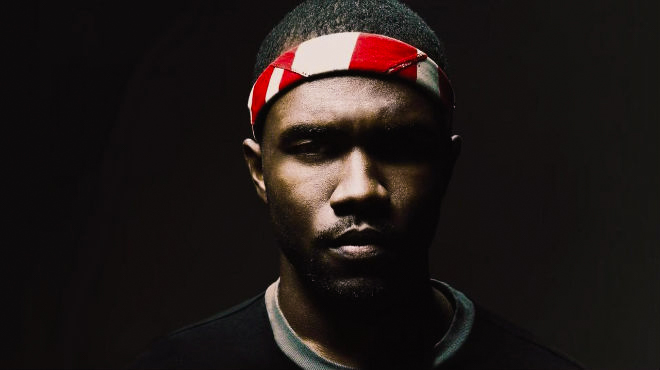
c/o dbknews.com
For someone so ubiquitous on social media, Frank Ocean is surprisingly, profoundly quiet. He’s the kind of guy who is silent for a long time, comes out, writes a song or a note that shakes the world, and then disappears. No one really knows where he goes, but someone is always looking for him, asking where he is, and where the new music is. Because of his spontaneity, I lived in the same city as Frank Ocean for a year, and never knew it. There’s a chance I walked by him on the street every once and a while, but I wouldn’t know. Frank Ocean has a way of blending in, disappearing until he is needed the most.
To wit, four years ago there was nothing, and then there was a letter, tragic and beautifully written and honest, and then there was Channel Orange. The album was named after the filter through which its author saw the world while experiencing his first love. You feel the steam of the LA heat off his hazy baritone. You can hear longing in the mixing of the drums, the strings, the pulsing, and anxious synths. The organ on “Bad Religion” swallows you whole. A sample of cheerleaders sounds off, far in the background, happy and lonely. Love and music are almost always intertwining, but I had never heard it this complex, this syrupy. And never through stories this diverse. Frank Ocean travels through time, falls off the roof, runs past the endzone, cries in a taxi cab, and babies are born under pink skies. It was the first time I discovered something I love in real time; among the first masterpieces of the 21st century.
Then silence. Years of silence. Brilliant, calculated. His voice appeared every once and a while to remind the world of his own existence. He occasionally wrote a hook, and co-wrote some songs. Suddenly, a promised album, and then total silence. The album date passed, and then another date, and another. There were whispers of “Boys Don’t Cry.” How good it would be. Who would be on it? Adele was angry that it wasn’t here yet. Collaborators assured it would arrive. But it didn’t, and it didn’t, and it didn’t.
Then a video, an empty, hazy, grainy music video. Someone who very much looked like Frank Ocean stoically woodworked. It looked like an album was imminent. But even then it wasn’t. He just kept building, suspending the world with an anti-narrative. There were snippets of songs, canned strings, and silent echoes. I couldn’t watch, and I didn’t listen, I didn’t want fragments. Somehow, inexplicably, there was an album, a visual album, and it was “Endless.” “Endless” is fragmented, half finished, fascinating. “Slide on Me” pulses, “Rushes” swoons, “At Your Best (You Are Love)” is as longing and lovely as anything he has ever done. Above all else, “Endless” is strange. It’s not unsatisfying, but it doesn’t fill a room the way Channel Orange did. Ocean’s voice, thick and strained, sounds miles away. These half-finished, half-mixed songs were great, but they weren’t right, and the 45-minute accompanying video, deliberately and strangely boring, didn’t feed the desire for new, refined Frank music as much as it increased the hunger.
When I found out about “Blonde,” I was drunk. I was at a Jimmy Buffet Concert. I was confounded. This album was supposed to be called “Boys Don’t Cry.” He teased it for a year. My brain hummed, warm with questions and curiosity and righteous anger at chauvinist Parrothead tailgaters and tequila. The people I was with, exasperated with my reaction to this news, sent me home. The next day, I listened to the album, deeply, truly hungover. It was real. It was here. It was a Frank Ocean album.
Drums were always important to Frank Ocean’s music. The tenor and tempo set his moods, they were his backdrop. Here, they’re almost entirely absent, and when present, they’re either blocky or distant. Instead, Frank sings over swirling thick guitars. The natural, visceral feeling of a strummed guitar is the definitive mood and tone of the song cycle. But the guitar is a chameleon. It shimmers, it chimes, it buzzes and hums, sometimes on the same song, sometimes in the same moment.
Over the course of an hour, Ocean recruits young, powerful voices, and uses them as foundational pieces instead of decoration. Beyoncé is here, in echoes, singing background on “Pink and White.” Kendrick Lamar shows up, ad-libs a few words, and disappears into the mist. James Blake sings and plays aching piano on “White Ferrari.” And Andre 3000, seemingly coming out of retirement during every Ocean release, delivers as hungry and potent a verse as any delivered this year. These moments feel orchestrated, part of some grand design.
If the design is grand, the content is small and modest. These are snapshots, not stories. Frank Ocean rejects a lover and isn’t devastated when someone rejects him. He spirals in nightlife. He has a brief moment of solitude and goes quietly on a drive.
I don’t want to grade or rate “Blonde.” I think it’s great, and it’s warm. Swirling strange charms have wrapped themselves around my head. But it’s too delicate, too fragile to critique. All I know is this: Frank Ocean matters. I know other people feel about him the way I do. And for us, “Blonde” is a miracle.
Comments are closed